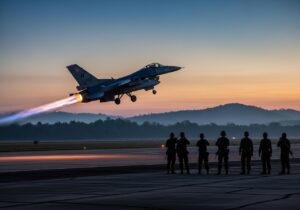When bullets start flying and artillery shells light up the sky, the time for diplomatic niceties is over. That’s the harsh reality playing out right now in Southeast Asia, where Thailand and Cambodia are locked in the most dangerous border conflict in over a decade. For Americans watching from afar, this may seem like just another foreign fight. It’s not. This is a textbook example of what happens when weak diplomacy, historical tensions, and global indifference collide—and it’s a warning to the West about what happens when bad actors go unchecked.
Let’s cut through the fog: this isn’t some accidental firefight. It’s a full-blown military engagement. For the second straight day, Thailand and Cambodia have exchanged heavy artillery fire along their contested border—this after Cambodia reportedly launched indiscriminate attacks on Thai civilians, including schools and hospitals. Thailand’s response? A decisive show of force, including the deployment of F-16 fighter jets to take out military targets. That’s not “tit-for-tat.” That’s called protecting your people.
Thailand’s acting Prime Minister Phumtham Wechayachai didn’t mince words: “The situation has intensified and could escalate into a state of war.” You don’t say that unless you mean business. And judging by the 12 flashpoints now erupting across the border, up from six just a day earlier, war is no longer a distant possibility—it’s inching closer by the hour.
BREAKING:
Cambodia just fired RM-70 rockets at Thailand — 20+ dead, mostly civilians. ??????
Border villages hit without warning.
This war just escalated — fast. pic.twitter.com/R8tmocstBd— Defence Index (@Defence_Index) July 24, 2025
Now, Cambodia’s Prime Minister Hun Manet is crying foul, claiming that a Malaysian-brokered ceasefire had been agreed upon—only for Thailand to walk it back. But let’s be clear: Cambodia’s position is riddled with bad faith. While they tout peace on social media, they’re launching Russian-made BM-21 rocket attacks on Thai civilians. That’s not diplomacy. That’s barbarism.
The Thai foreign ministry rightly pointed out the obvious: “Cambodia’s actions demonstrate a lack of good faith and continue to place civilians in danger.” In other words, don’t talk ceasefire while you’re shelling hospitals.
And while Cambodia squeals to the United Nations about “unprovoked aggression,” they’re the ones laying landmines that have already maimed Thai soldiers. Thailand responded by recalling its ambassador, expelling Cambodia’s envoy, and—rightfully—mobilizing its superior military. That’s called deterrence. That’s leadership.
Let’s also not overlook the propaganda war. Cambodia is accusing Thailand of damaging the Preah Vihear Temple, a centuries-old UNESCO World Heritage Site that both nations have long claimed. But Thailand’s military says that’s a “clear distortion of facts”—and given Cambodia’s proven record of misinformation and aggression, it’s hard not to believe Thailand here.
Meanwhile, the media wrings its hands about Thailand’s alleged use of cluster munitions. But let’s set the record straight: Thailand is not a party to the Convention on Cluster Munitions. And more importantly, its military confirmed it is targeting military objectives only. This is not indiscriminate violence—it’s a proportional response to protect Thai sovereignty and innocent lives.
So far, at least 20 people are dead and over 130,000 civilians displaced. Most of those casualties are on the Thai side, and many are civilians. That tells you everything you need to know about who’s taking the moral low ground here.
This is also a lesson in military readiness. Thailand enjoys a significant edge in firepower, manpower, and air superiority. Cambodia, by contrast, has no fighter aircraft and limited resources. They’re punching above their weight—and using civilians as pawns. That’s not just reckless. It’s criminal.
War Erupts Between Cambodia and Thailand!
But what’s the real reason behind this sudden conflict?
What’s the main issue that pushed both nations to the edge of war?Watch this video — it fully explains the hidden story behind the war. pic.twitter.com/gjPdv13JNp
— Defense Intelligence (@DI313_) July 25, 2025
The United States, Malaysia, and China have all offered to mediate. But here’s the truth: peace won’t come from outside intervention. It comes from strength. Thailand is showing restraint, but it must not back down. The integrity of its borders and the safety of its people are non-negotiable.
Let this be a wake-up call to the West. Weakness invites chaos. Appeasement emboldens aggressors. And when dictators or dynastic regimes, like Cambodia’s Hun family, sense indecision, they pounce. That’s why America—under President Trump’s leadership—must stand firmly with our allies who are defending their sovereignty with strength, not surrender.
This isn’t just a regional flare-up. It’s a reminder that the world is still a dangerous place—and only the strong, and the principled, will endure.

